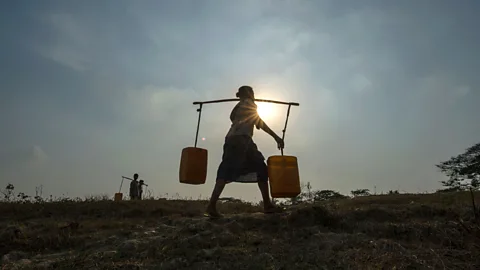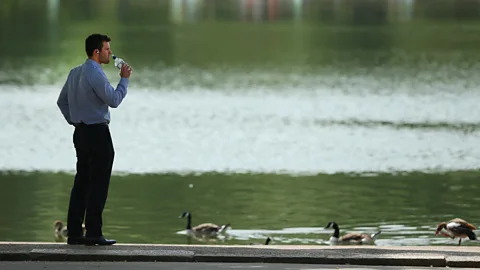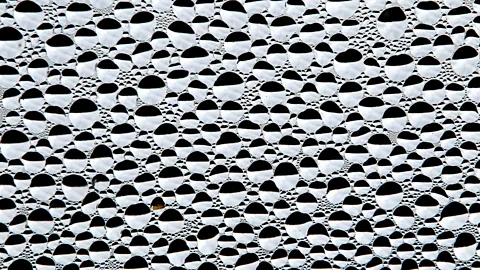Tapping H2O from thin air could solve looming water crises
 Getty Images
Getty ImagesOur bodies need water for survival, and nations need it to avoid war. The good news is that there’s a new source – the atmosphere.
Grand Ideas
The 21st Century is continually throwing us new challenges and expecting us to adapt – but for every Earth-shattering megatrend, there are dozens of genius solutions. Follow them all in BBC Future's special series, Grand Ideas.
Water: it poses one challenge after the next in the 21st Century. It’s increasingly scarce, it’s increasingly dangerous as sea levels rise, and it’s increasingly changing the workforce.
But one of its most vital functions is often overlooked: the fact that it’s a lynchpin for (relative) world peace. Without clear distinctions of who it belongs to and how to share it, the world would be thrown into chaos.
Earlier this year as part of our Grand Challenges series, we reached out to a of water experts to describe the big problems we’re facing when it comes to the precious commodity. What they said was clear: “hydro-politics” – politics surrounding the availability and accessibility to water – will shape the 21st Century.
Take an example: the Nile flows through myriad countries, starting in Ethiopia and ending in Egypt. That gives Ethiopia an upper hand in geopolitics, because if tensions prompted it, it could theoretically cut off or limit that huge water supply to Egypt.
 Getty Images
Getty ImagesIn an ever-changing world with an ever-changing climate, water is integral to prevent widespread conflict. But how can we ensure that everyone get their fair share?
As part of our Grand Ideas follow-up series, we reached back out to our and asked them to nominate solutions to the looming challenges facing the world.
One of those experts is Zenia Tata, executive director of global development and international expansion at the non-profit XPrize. Tata’s solution? Through clever technology, give a greater number of people the ability to tap their own water.
“The obvious revolution is to create decentralised, on-demand, community-level systems – giving people their basic needs, wherever and whenever they want them,” Tata says.
To that end, her organisation, XPrize, has created a Water Abundance project that aims to make water more available for all – through technology.
In a $1.75m (£1.29m) prize competition, the non-profit is asking teams of engineers from around the world to create “a device that extracts a minimum of 2,000 litres of water per day from the atmosphere using 100% renewable energy, at a cost of no more than two cents per litre.” Or as the organisation puts it, “harvesting fresh water from thin air”. If the XPrize competitors can come up with such a device, it’ll be revealed next August.
 AFP/Getty Images
AFP/Getty ImagesIt might sound difficult, but researchers are already well on the way to achieving this goal. One team that has already been exploring water-harvesting technology is led by Omar Yaghi at the University of California, Berkeley. Using materials called metal organic frameworks – a powder that ‘harvests’ liquid from the atmosphere in its pores, they have shown that as little as 1kg of the powder can trap nearly 3 litres of water in only 12 hours. In humid parts of the world, this technology could provide an entirely new water source for people, without having to rely on centralised gatekeepers.
Since the dawn of humanity, it can be argued that fresh water has been the most basic, most important thing for survival. But as we move further into the 21st Century, water is now even more important. Its availability (will there be enough?) and accessibility (will everyone get some?) will be key issues the human race will have to grapple with.
Luckily, there’s no shortage of people with ideas ready to tackle this issue….
For more insights and ideas about water from Zenia Tata and more experts, click here
